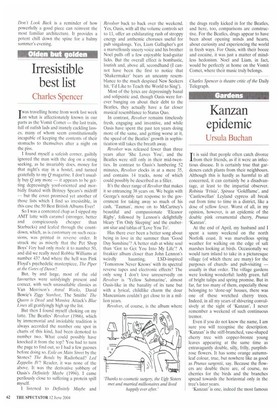Irresistible best list
Charles Spencer
Iwas travelling home from work last week on what is affectionately known in our parts as the Vomit Comet — the last train, full of oafish lads and inanely cackling lasses, many of whom seem constitutionally incapable of keeping the contents of their stomachs to themselves after a night on the piss.
I found myself a safeish corner, guiltily ignored the man with the dog on a string seeking, as he invariably does, money for that night's stay in a hostel, and turned gratefully to my Q magazine. I don't usually buy Q any more — it appears to be getting depressingly yoof-oriented and morbidly fixated with Britney Spears's midriff — but the cover promised yet another of those lists which I find so irresistible, in this case the 50 Best British Albums Ever!
So I was a contented chap as I sipped my AMT latte with caramel (stronger, better and conspicuously cheaper than Starbucks) and leafed through the countdown, which, as is customary on such occasions, was printed in reverse order. It struck me as miserly that the Pet Shop Boys' Very had only made it to number 50, and did we really need Robbie Williams at number 43? And where the hell was Pink Floyd's psychedelic masterpiece, The Piper at the Gates of Dawn?
But, by and large, most of the old favourites were satisfyingly present and correct, with such unassailable classics as Van Morrison's Astral Weeks, David Bowie's Zimy Stardust, The Smiths' The Queen is Dead and Massive Attack's Blue Lines all gratifyingly high up the list.
But then I found myself choking on my latte. The Beatles' Revolver (1966), which by immemorial and inviolable tradition is always accorded the number one spot in charts of this kind, had been demoted to number two. What could possibly have knocked it from the top? You had to turn the page to find out, so I had a few guesses before doing so. Exile on Main Street by the Stones? The Bends by Radiohead? Led Zeppelin IV? Reader, it was none of the above. It was the derivative yobbery of Oasis's Definitely Maybe (1994). 1 came perilously close to suffering a protein spill myself.
I listened to Definitely Maybe and Revolver back to back over the weekend. Yes, Oasis, with all the volume controls set to 11, offer an exhilarating rush of stroppy energy and anthemic choruses useful for pub singalongs. Yes, Liam Gallagher's got a marvellously sneery voice and his brother Noel pulls off a few enjoyable lead-guitar licks. But the overall effect is bombastic, loutish and, above all, secondhand (I cannot have been the first to notice that `Shakermakee bears an uncanny resemblance to the much despised New Seekers hit, 'I'd Like to Teach the World to Sing).
Most of the lyrics are depressingly banal and solipsistic and, though Oasis were forever banging on about their debt to the Beatles, they actually have a far closer musical resemblance to Status Quo.
In contrast, Revolver remains timelessly fresh, engaging and inventive, and while Oasis have spent the past ten years doing more of the same, and getting worse at it, the speed of the Beatles' growth in sophistication still takes the breath away.
Revolver was released fewer than three years after She Loves You', and the Beatles were still only in their mid-twenties. In contrast to Oasis's lumbering 52 minutes, Revolver clocks in at a mere 35, and contains 14 tracks, none of which could possibly be described as a filler.
It's the sheer range of Revolver that makes it so entrancing 38 years on. We begin with George's notably tart response to the government for taking away so much of his cash. 'Taxman', move on to McCartney's beautiful and compassionate 'Eleanor Rigby', followed by Lennon's delightfully bleary 'I'm Only Sleeping' and the exuberant sitar and tablas of 'Love You To'.
Has there ever been a better song about being in love in the summer than 'Good Day Sunshine'? A better stab at white soul than 'Got to Get You Into My Life'? A freakier album closer than John Lennon's weirdly haunting, LSD-inspired 'Tomorrow Never Knows' with its spectral reverse tapes and electronic effects? The only song I don't love unreservedly on Revolver is 'Yellow Submarine', almost Oasis-like in the banality of its tune but with a lyrical, childlike charm the dour Mancunians couldn't get close to in a million years.
Revolver, of course, is the album where the drugs really kicked in for the Beatles, and here, too, comparisons are constructive. For the Beatles, drugs appear to have been about opening minds and hearts, about curiosity and experiencing the world in fresh ways. For Oasis, with their booze and cocaine, it was just a matter of mindless hedonism. Noel and Liam, in fact, would be perfectly at home on the Vomit Comet, where their music truly belongs.
Charles Spencer is theatre critic of the Daily Telegraph.


















































































 Previous page
Previous page